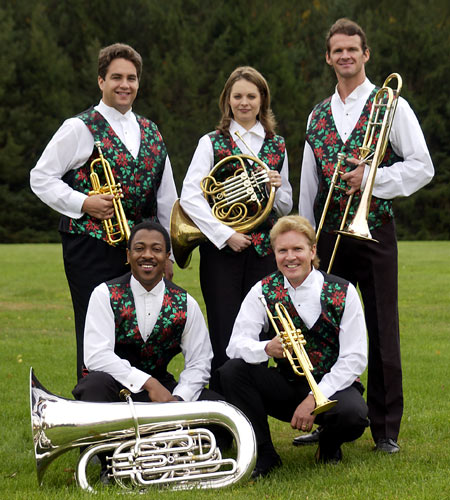Empire Brass serves up breezy if lightweight afternoon of music

Brass quintets work under a major handicap with respect to repertory. There is a paucity of works written exclusively for the ensemble, and extended pieces are mostly significant by their absence. With this in mind, it’s no wonder these ensembles turn to transcriptions, as the Empire Brass did in their Sunday Afternoons of Music program at Gusman Concert Hall.
Given an intimate knowledge of their instruments, the Empire generally does their own arrangements. This affords them the opportunity to exploit colors of the individual instruments and collective, write for their own performing strengths, and give special twists of humor when applicable. Rarely does the music sound much like the original, but they usually manage to capture some of the requisite flavor and aroma of whichever bottle of wine they open.
Since most programs combine both original and transcribed works, this one surprised by consisting entirely of short transcriptions ranging from the 16th-century Tieleman Susato to Duke Ellington. There were fifteen arrangements in all, plus the encore Amazing Grace. Several chunks from larger works, plus many pops favorites were included. While most would serve as respectable encores, to build a program almost exclusively on such fare made for a joyful if musically limited experience.
Prokofiev’s Troika from his Lieutenant Kije Suite lost relatively little in transcription, save the sleigh bells. A traditional 14th century Irish Jig was a swinging success, as was a Gigue by the 16th-century English consort composer Anthony Holborne. Tchaikovsky’s Arabian Dance from the Nutcracker was a caricature that moved without grace through a trail of pure Klutz. The Turkish Rondo from Mozart’s eleventh Sonata provided tuba player Kenneth Amis the opportunity of laughing with the audience at the sheer wackiness of the arrangement. It was a scream, even if it wasn’t Mozart.
Meredith Willson’s 76 Trombones turned trombonist Mark Hetzler into a Paganini-like virtuoso as he negotiated the variants, pedal tones, and all its freaky challenges with awesome skill. The free arrangement could never fit into the original show, but it worked beautifully here. If Dvorak’s first Slavonic Dance did not work quite as well, it certainly had spirit, along with the occasional mad scramble to keep things together. Only Gershwin’s Summertime seemed remote from its Porgy and Bess source, as Serena could never have rocked her baby to sleep with the tune blasting forth from trumpet and trombone.
Each selection was introduced by the players who relished their roles as stand-up comics. At times the large audience joined the fun by rhythmically clapping, and the players sometimes wandered into the audience in order to serenade the first few rows.
It was an enjoyable evening with infectius humor, and the Empire Brass mostly maintained their reputation for technical excellence, a few clunkers apart. The substitute second trumpet, Brian Neal did a commendable job standing in for Marc Reese who had injured his hand.
Posted in Performances
Leave a Comment
Mon May 17, 2010
at 12:05 pm
No Comments
